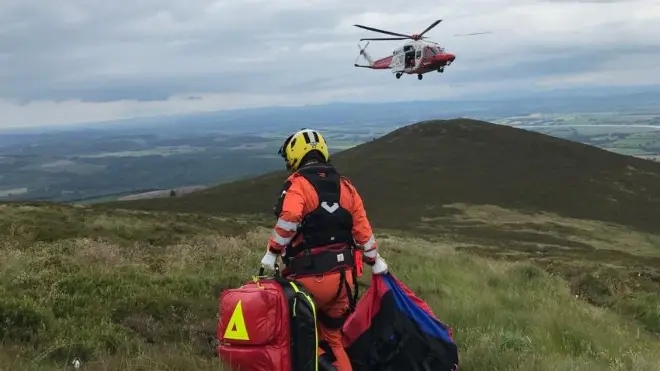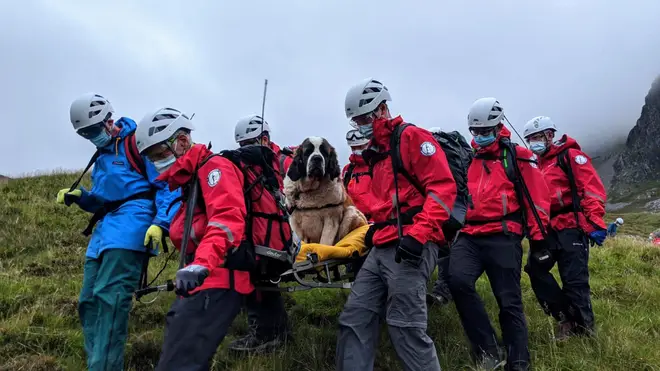
Nick Abbot 10pm - 1am
31 July 2020, 09:21

Scarborough and Ryedale Mountain Rescue Team give climbing advice
Mountain rescue teams are warning staycationers to be prepared before hikes and climbs amid a "tidal wave" of callouts.
Holidaymakers seeking a UK getaway have been warned about the dangers of walking in some of the country's popular hiking destinations following an increase in rescue operations.
On Wednesday, Keswick Mountain Rescue Team said they are dealing with a "tidal wave" of callouts as inexperienced and ill-prepared staycationers put their lives at risk trying to climb England's highest peaks in the Lake District without sufficient equipment or knowledge.
The team said 11 of the 19 incidents they responded to since last Friday were "truly avoidable."
With forecasters predicting one of the hottest days of the year so far today, a team in Yorkshire said they are expecting more call-outs due to an increase in domestic tourism.
Ian Hugill from the Scarborough and Ryedale base told LBC News people need to be prepared before going on hikes.
Read more: Staycation surge leaves Brits scrambling for UK holiday spots
Read more: Rescue dog saved from highest peak in England after collapsing

He said: "Mountain rescue are pushing something called 'Be Adventure Smart,' and it just asks you to answer three questions: Have I got the right kit for the day such as a map, a compass and a torch? Do I know what the weather's like, not just now but when I'm coming back off the hill? And do I have the right skills?"
Mr Hugill said his team have been just as busy this year as they have been in previous years despite the coronavirus lockdown.
"Thankfully, most of the people we've been called to have had an accident, accidents do happen, but we have had one or two incidents which were avoidable," he said.
"People 'tombstoning' at a waterfall in Goathland not knowing the depth of the water, not knowing what's in there and sustaining injuries which involved all the emergency services, ourselves, the air ambulance and the coastguard helicopter.
"Thankfully, the gentleman was okay when we got him to hospital, but that was an avoidable incident and thankfully the rest of them have been genuine accidents."
Mr Hugill also advised people to look where they are going and not get distracted by their mobile phones, even if they are using them for directions. He also said phones need to be charged should the rescue team need to locate someone.

Yorkshire campsite visitor explains why he chose UK Staycation
Meanwhile, drones are being deployed in UK coastguard search-and-rescue operations for the very first time this weekend.
The new equipment will be launched from Caernarfon, North Wales, to help coastal and mountain missions, the Maritime and Coastguard Agency confirmed.
They will carry out safety patrols above beaches stretching from Conwy Bay to Llandudno, as well as across Snowdonia National Park.
Footage recorded by the unmanned aircraft, developed by Bristow Group, will help rescue teams decide the most suitable response and will allow helicopter teams to remain grounded until necessary.
It will initially only be used on weekends as part of a trial.
Read more: Caravan advert views up 18% ahead of expected staycation boom
Read more: Coronavirus holiday scams warning as people look for staycations

Maritime minister Kelly Tolhurst said: "We will stop at nothing to keep people safe on our shores and in our seas, exploring new and innovative ways to further bring search and rescue into the 21st century.
"Drones have the potential to help our coastguard teams help save even more lives, so I'm excited we're pioneering these advances in the UK."
Director of HM Coastguard Claire Hughes said: "Search and rescue is about saving lives. Every second counts and every minute saved can prove the difference between life and death.
"This kind of technology has a big part to play in those moments alongside our helicopters, coastguard rescue teams and our partners from the RNLI (Royal National Lifeboat Institution) to independent lifeboats and hovercraft."
Additional reporting by Vicki Smith.